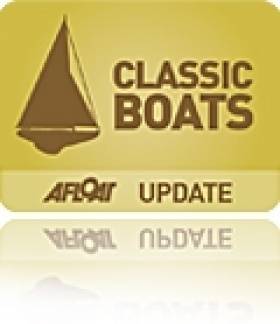Displaying items by tag: historical
Riva Speedboats Gather For Historic Rally in Venice
#riva – About 50 vintage runabouts will meet in Venice, from 2 to 7 July, to take part to the great rally organised by the Riva Historical Society, the International Federation of historic Rivas that brings 700 owners from all over the world together. For five days, starting from the moorings at Darsena Sant'Elena, the fleet will visit the islands in the Lagoon, then parade on the Grand Canal for the great final parade of Sunday July 5.
MAY 2015 – From 2 to 7 July Riva Historical Society, the International association that brings together the owners of the most famous runabouts in the world, organizes the "Riva Days La Serenissima" in Venice. A fleet of about 50 wooden boats will arrive in the Lagoon to celebrate one of the greatest myths in the history of leisure boating.
The Riva runabouts taking part to the event, coming from Italy, Germany, Holland, France, Switzerland, Austria, Sweden, USA, UK, and the Principality of Monaco, were built between 1955 and 1983. All the models that made the history of the Yard will parade: Aquarama and Ariston, Florida and Tritone, Junior and Olympic and Saint Tropez. Some of these boats were once the property of famous people, like entrepreneur Attilio Monti, Perfetti of the candy industry, the sportman and entrepreneur Sergio Tacchini, countess Caracciolo and Carlo Riva himself.
The fleet will be based at the new marina Darsena Sant'Elena, a short distance from the historic Venetian Arsenal and the Navy school Francesco Morosini. From there the runabouts, divided into two groups called respectively 'Canaletto' and 'Palladio', will depart every day to cruise to the islands of the Northern Lagoon, like Mazzorbo and Burano, or the Southern Lagoon, to Pellestrina and Poveglia.
Visits are planned to the Serenella Shipyard and the glassworks in Murano, palaces and museums of Venice, the Venetian Expo "AQUAE". There will be stops for bathing and picnic, dancing and dinners, including one at the famous Locanda Cipriani in Torcello. Sunday July 5 the fleet will circumnavigate Venice to end in a great parade in the Grand Canal, with the crews attired in costumes pertaining the water world, real or fantasy, to compete for the Concours d'Elegance FREDERIQUE CONSTANT.
The event will end on Monday July 6 with a big gala dinner in the splendid halls of Cà Vendramin Calergi, the Venetian Casino. On this occasion the boats and the owners will be awarded, who distinguished themselves during the "Riva Days La Serenissima".
With this event the Riva Historical Society intends to repeat in the Venice area the same success as in 2012 during the Riva Days organized in Sarnico, on Lake Iseo. In that event, rightly called the largest gathering of a single brand in world boating, as many as 143 historic Rivas and 450 people from over 15 Nations celebrated the 90th anniversary of Carlo Riva. For the first time it was possible to see at least one of all Riva models ever built.
Riva Historical Society
Riva Historical Society, founded in Milan in 1998, is the international association that protects and promotes the culture of the most famous wooden runabouts in the world. The approximately 700 members divided into 13 departments, are from more than 30 nations in the 5 continents.
Historic President of the Riva Historical Society is the Milanese architect Piero Maria Gibellini, official biographer of Carlo Riva and member of the Powerboat Commission of ASI (Italian club of historic motor vehicles). Gibellini wrote 7 encyclopedic volumes now considered by experts the complete works on the history of the Riva yard. His latest work, Riva Historical Registry RHS, the product of 15 years of research, collects more than 800 images and a census of over 2300 Riva boats still sailing in 40 different Countries.
Every year, in the spring, the Riva Historical Society organizes a training course for "judges", in order to pass on to future generations the theoretical and practical knowledge related to the restoration and maintenance of a Riva speedboat. On that occasion, the trainees would visit a number of restoring yards, both in Italy and abroad, where they learn live how to become scrutineers.
Marine Notice on Exemptions from EU Regulations for Recreational Water Craft
#NEWS UPDATE - A recent Marine Notice from the Department of Transport, Tourism and Sport (DTTAS) advises consumers, retailers and manufacturers on the types of craft to which the EU recreation water craft regulations do not apply.
In general recreational craft and related products must meet the essential safety, health, environmental protection and consumer protection requirements of the Recreational Craft Directive as set out in the Recreational Craft Regulations.
However, these regulations do not apply to craft intended solely for racing; canoes and kayaks; gondolas and pedalos; surfboards; historical water craft and replicas; experimental craft and ones built for own use; commercial craft; and a number of others.
These exceptions are however still subject to the EU's General Product Safety Directive.
Complete details are included in Marine Notice No 56 of 2011, a PDF of which is available to read and download HERE.
- Marine Notice
- water craft
- regulations
- EU
- Department of Transport, Tourism and Sport
- DTTAS
- consumers
- retailers
- manufacturers
- recreational craft
- Safety
- Health
- environmental protection
- Recreational Craft Directive
- Recreational Craft Regulations
- racing
- Canoes
- Kayaks
- gondolas
- pedalos
- surfboards
- historical
- replica

























































